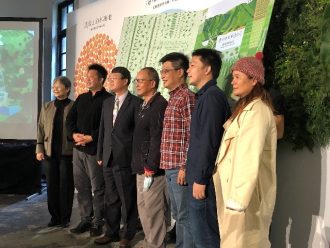IPSI Newsletter

TOPIPSI NewsletterIPSI Newsletter, December 2021
IPSI Newsletter, December 2021
2021.12.22
Dear IPSI members and friends,
Season’s greetings from the IPSI Secretariat in Tokyo, Japan!
We would like to sincerely thank you for your ongoing support and cooperation. 2021 has been another year with challenges for many, particularly due to the global COVID-19 pandemic, and of adjusting to the new normal. It was also the beginning of the “decisive decade” towards achieving the SDGs and tackling climate change and biodiversity loss; we saw the start of the UN Decade of Ecosystem Restoration and the adoption of the Glasgow Climate Pact.
IPSI members have continued to make progress on their work with SEPLS on the ground and online despite the challenges. Our membership has now grown to 283 organizations from all regions of the world!
2022 will be an even more important year for biodiversity as the post-2020 Global Biodiversity Framework will be adopted in Kunming, China. We look forward to working with all of you. We wish you the best of health and success in your own lives and in all your work towards “societies in harmony with nature”.
This month we welcome four new members to IPSI! We also present a recent publication: “Community-based responses for tackling environmental and socio-economic change and impacts in mountain social–ecological systems”; the release of four picture books on SEPLS; a UNU-IAS open house event; a case study on the protection of pheasant-tailed jacanas submitted by the Taiwan Wild Bird Federation of Chinese Taipei, and much more!
As always, please feel free to contact us to submit any new case studies or other information about your activities, or if you have any questions or comments.
We wish you a happy New Year!
IPSI Secretariat
IPSI Welcomes Four New Members and Endorses Two New Collaborative Activities
We are pleased to announce that at its sixteenth meeting (SC-16), held online on 14th December 2021, the IPSI Steering Committee endorsed four new member organisations. Bringing IPSI’s total membership to 283 organisations! Meet the new members:
- The Goat Trust (Non-governmental or civil society organisation, India)
- Community Agriculture and Environmental Protection Association Cameroon (CAEPA) (Non-governmental or civil society organisation, Cameroon)
- Coelacanth Shokudou. LLC (MUJUN) (Industry or private sector organisation, Japan)
- Green Development Advocates (Non-governmental or civil society organisation, Cameroon)
We look forward to collaborating closely with all of them to promote the Satoyama Initiative concept in the future.
Moreover, the Steering Committee approved two new IPSI Collaborative Activities, bringing the total number of activities to 55. The new activities are:
- Ifugao-Noto Satoyama Meisters Exchange – by Ifugao State University and Kanazawa University in cooperation with UNU-IAS, Ifugao Satoyama Meister Network, Noto Satoyama Satoumi Meisters Network, and Ifugao Provincial Government.
- Publication of a box set of four picture books on SEPLS – by Soil and Water Conservation Bureau (SWCB), Forest Bureau, Hualien District Agricultural Research and Extension Station, National Dong-Hwa University, SWAN International, Taiwan Landscape Environment Association (TLEA), in cooperation with National Chung-Hsin University. Read about them below!
IPSI members are encouraged to propose any activities carried out cooperatively by multiple organisations, including at least two IPSI members, as IPSI Collaborative Activities. If any IPSI members would like to propose a new Collaborative Activity, please contact the IPSI Secretariat for the Proposal Form.
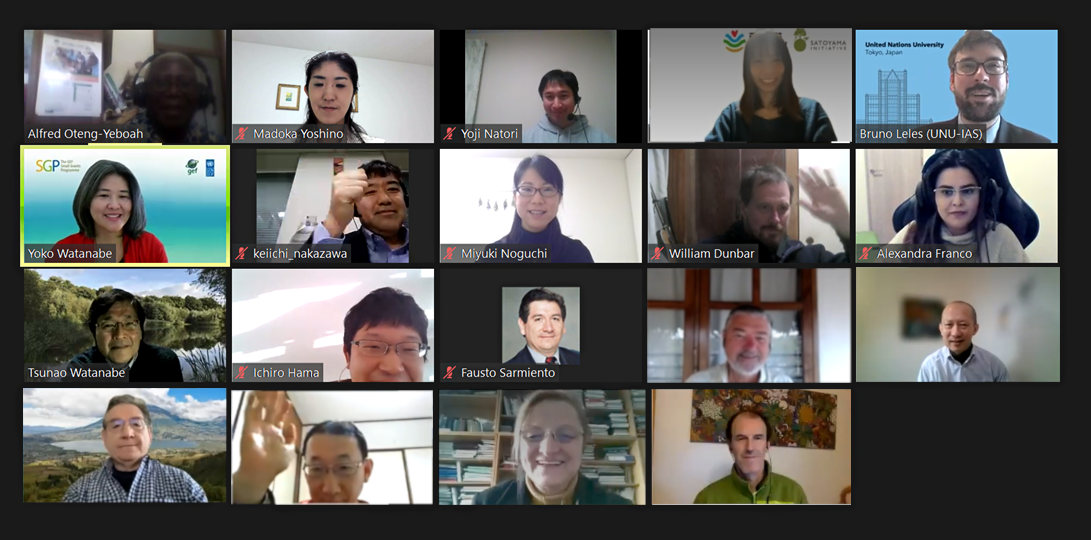
UNU-IAS Online Open House for Prospective Students
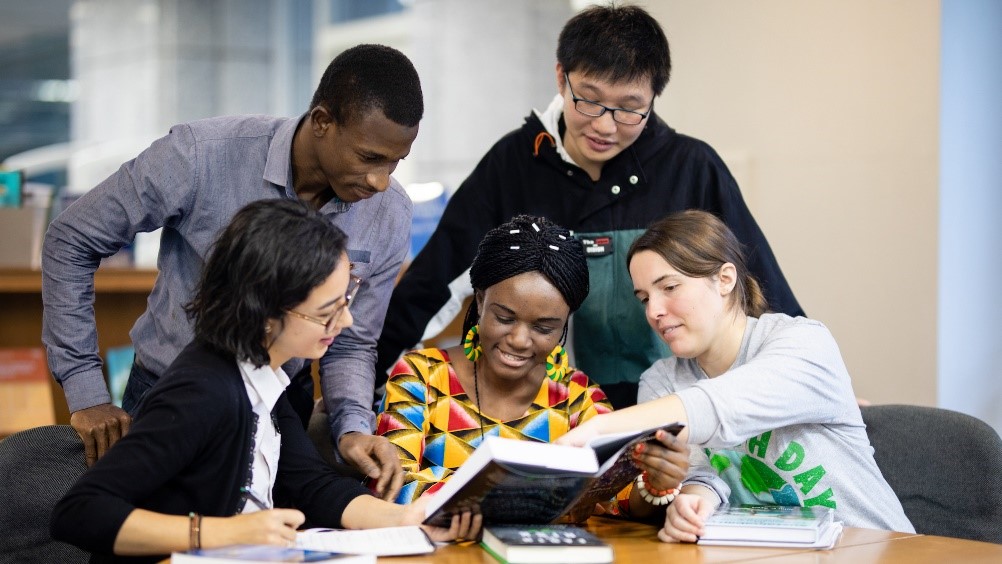
UNU-IAS will host two online “open house” events for prospective students, which will provide insights into the learning experiences, ongoing research, and other opportunities available to students at the institute. UNU-IAS offers master’s and doctoral degree programmes that aim to produce the policymakers and researchers of tomorrow, who will be at the forefront of global efforts towards a more sustainable future.
During the event our alumni will share “why UNU-IAS?” from their own learning experiences and explain the research they conducted during their studies, as well as how it has enabled their career growth.
Date: Friday, 28 January 2022
Go here for more information and registration
Deadline Extension: Call for Abstracts for the Satoyama Initiative Thematic Review Volume 8
We would like to thank everyone who submitted an abstract for the eighth volume of the annual series “Satoyama Initiative Thematic Review” by 20 December. We are pleased to announce that the deadline has been extended to 5 January 2022. The eighth volume will feature the theme “Ecosystem restoration through managing socio-ecological production landscapes and seascapes (SEPLS)”. Authors from IPSI member organisations, who have case studies relevant to this theme, are highly encouraged to submit a manuscript following the guidance provided in the call for papers. Authors are requested to submit an abstract (400 words) using the abstract format available on the IPSI website and email it to the IPSI Secretariat (sitr@unu.edu) by 5 January 2022. After the screening, submission of a full manuscript will be requested by 20 February 2022. The selection of authors is planned for March 2022.
For the past volumes of the SITR, please see here.
For details on the call for papers, please see here
New Publication: Community-Based Responses for Tackling Environmental and Socio-Economic Change and Impacts in Mountain Social–Ecological Systems
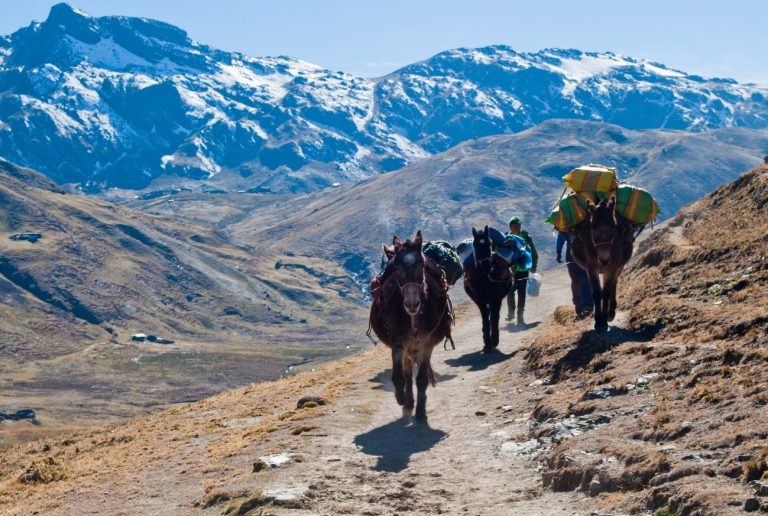
This paper, written by Himangana Gupta and Maiko Nishi, from the IPSI Secretariat, and Alexandros Gasparatos, from the University of Tokyo Institute for Future Initiatives, is a synthesis of 71 mountain-specific IPSI case studies to identify the major drivers of change, associated impacts, and response strategies in the mountain social-ecological systems (SES). Mountain SES are often rich in biological and cultural diversity with sustained human-nature interactions. Many mountain SES are experiencing rapid environmental and socio-economic change, demanding viable action for conservation to sustain ecosystem services for the benefit of their communities. This synthesis finds that overexploitation, land use change, demographic change, and the regional economy are the most prevalent drivers of change in the IPSI mountain SES, leading to negative consequences for biodiversity, livelihoods, indigenous knowledge, and culture. To counter these challenges in the study SES, stakeholders from the public, private, and civil society sectors have been implementing diverse legal, behavioral, cognitive, technological, and economic response strategies, often with strong community participation. Outlining the lessons learned from the IPSI case studies, this paper also shows IPSI’s alignment with the IPBES approaches and how community-based approaches can contribute meaningfully to the sustainable management of mountain landscapes.
Please see here to access the article.
Recent publication: Four Picture Books Illustrate Revival and Rebuilding of SEPLS
We are thrilled to announce the publication of four picture books that are part of an IPSI Collaborative Activity. You can read below the details of this impressive project. We hope these books reach people from all around the world!
The Soil and Water Conservation Bureau (SWCB), in collaboration with five other IPSI members from Chinese Taipei and the SeeDesign Co., has published a box set of four picture books depicting four cases of reviving or rebuilding local SEPLS that the SWCB supported and engaged in. These picture books use plain language as well as hand-drawn illustrations to help the general public better understand, appreciate, and support the ideas and practices of the Satoyama Initiative. The books are published in Chinese, English and Japanese to attract a wider audience.
The four cases and the four rural communities depicted in this box set include: “The Spring on the Highland”, which elaborates on how members of Gonglaoping Community in the central area of the island Taiwan strengthened bonding between old and young generations in co-managing their water resources and landscape to grow the most popular oranges and persimmons; “Farming Village Co. Unlimited” narrates how members of Gongrong and Ankang communities in northwestern Taiwan toiled and moiled for decades and finally brought back nature and biodiversity from the once degraded farmland and dying stream, and increased income from eco-friendly food production; “Letters the Blue Sea Wrote to the Land of Coastal Terrace” presents a beautiful production landscape in eastern Taiwan where indigenous people of Dipit and PateRungan tribes kept their weaving technique, tribal culture and heritage, and worked with the young generation to create terraced landscape along the coast as a love letter to mother nature; “Shining Herb Village” speaks passionately on how the second generation of Shangde community in southeast Taiwan followed the memory of childhood and returned home to work with the elders of the local Ami indigenous people in reviving the herbal industry along with the beautiful and fragrant production landscape.
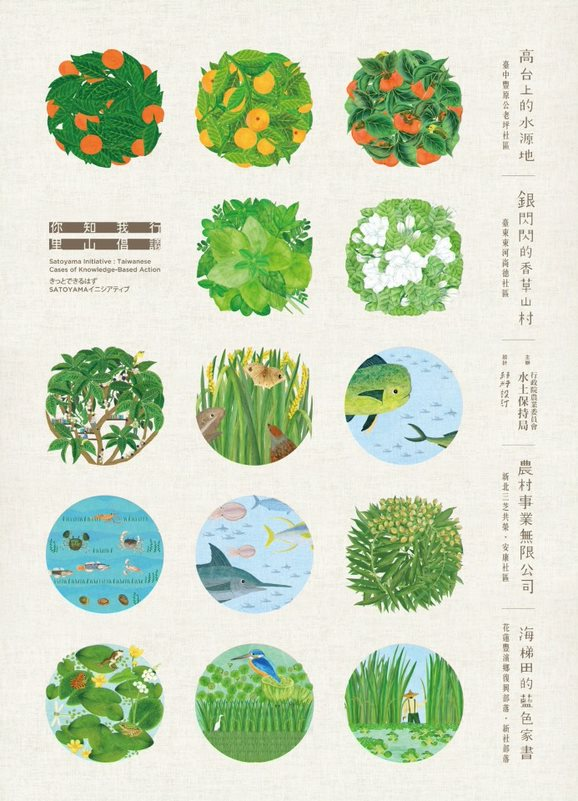
The SWCB would like to share these four beautiful stories with supporters of the Satoyama Initiative and readers all over the world. It is our hope that more people, particularly those of rural communities, are encouraged by these touching stories and are willing to work together and restore or rebuild their SEPLS so to fulfil the vision of the Satoyama Initiative: living in harmony with nature.
For information on how to purchase the books (Chinese and English), please see the press release by SWCB here. Its Japanese version will be published soon.
Photos from the publication launching ceremony in Chinese Taipei
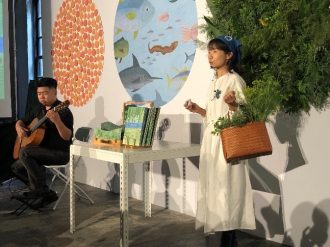
Event Report: Session at ISAP 2021 Highlights Benefits of Landscape Approaches
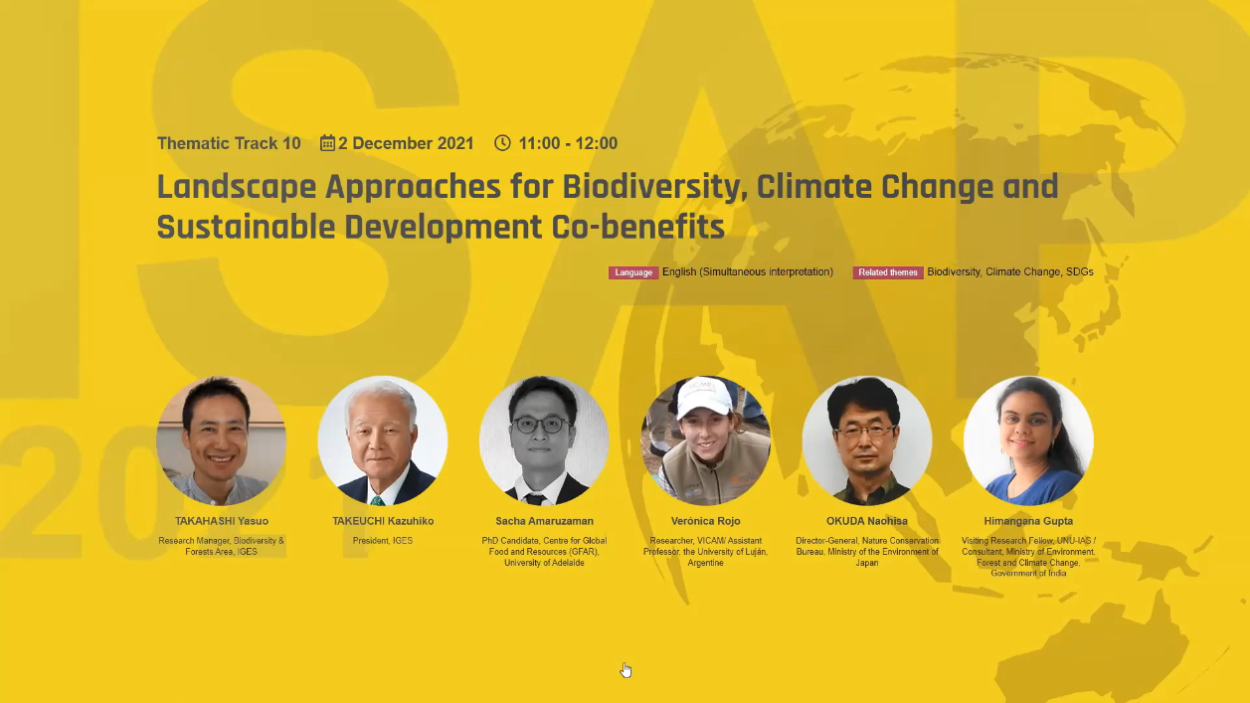
On 2 December 2021, the IPSI Secretariat at UNU-IAS co-hosted an online session at the 13th International Forum for Sustainable Asia and the Pacific (ISAP 2021) that highlighted the interdependence of biodiversity and climate change, focusing on landscape approaches. The Thematic Track Session, “Landscape Approaches for Biodiversity, Climate Change and Sustainable Development Co-benefits”, was organised in partnership with the Institute for Global Environmental Strategies (IGES). It presented two case studies from members of the International Partnership for the Satoyama Initiative (IPSI) with experience in socioecological production landscapes and seascapes (SEPLS) and was followed by a panel discussion.
For further details and a recording of the session, please see the ISAP website.
Case Study: A Case Study in Community Conservation: Reviving a Pheasant-tailed Jacana Population by Ensuring the Survival of the Socio-Economic Landscape in Guantian, Tainan, Chinese Taipei
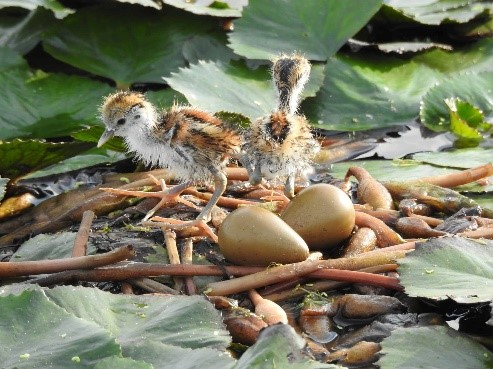
We are pleased to share a case study submitted by the Taiwan Wild Bird Federation of Chinese Taipei. This case study showcases the Pheasant-tailed Jacana Conservation Park (PTJCP), an area created in 2000 to provide a safe habitat for pheasant-tailed jacanas. The park staff evolved their conservation strategies to establish a model that balances development and conservation in the local communities.
Through long-term restoration, environmental education, and habitat management, the jacana population was able to increase. However, due to limited park space, the birds leave the safety of the reserve to find other habitats. Some local farmers used to add pesticides to rice seeds, which led to the deaths of not only jacanas but of other wild animals. Without safe habitats near the PTJCP, the jacana population would decrease again. Therefore, the park staff communicated directly with farmers, respecting their opinions, and helped them establish eco-friendly and organic farming practices.
Park staff built a strong bond between people and the land by providing farming experiences, promoting dialogue between producers and consumers, and creating a diversified distribution model to maintain traditional agricultural practices. This led to the jacana population increasing by 100 each year. Working alongside local communities preserved the local ecology, and harmonious coexistence between humans and nature was born.
To read the case study, please see here on the IPSI website.
Contact
Please be sure to let the Secretariat know if there are any changes in your e-mail address or contact information.
Secretariat of the International Partnership for the Satoyama Initiative
United Nations University Institute for the Advanced Study of Sustainability (UNU-IAS)
5–53–70 Jingumae
Shibuya-ku, Tokyo 150-8925
Japan
Tel: +81 3-5467-1212
Fax: +81 3-3499-2828
Email: isi@unu.edu
If you have been forwarded this newsletter and would like to SUBSCRIBE, you can do so on the IPSI website here.



